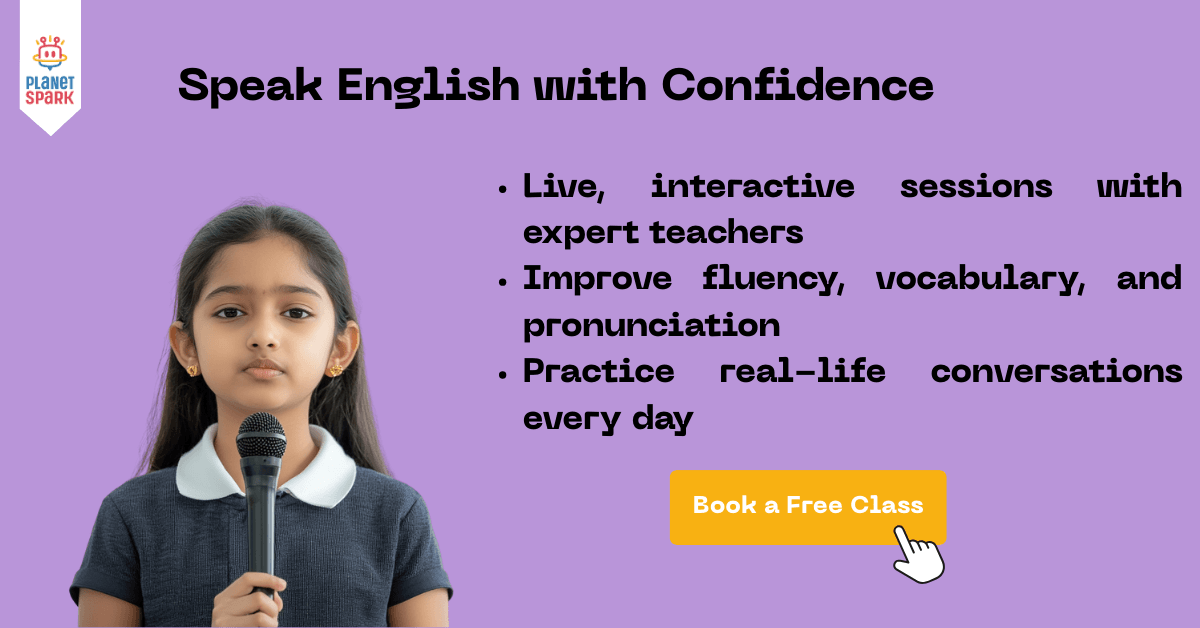Spoken English Skills for Career Growth and Job Interviews

Fluent English is essential for career growth and professional success. Whether in interviews, meetings, or emails, strong workplace English helps you communicate confidently and make a lasting impression.
This blog covers practical tips on mastering interview vocabulary, professional emails, business meetings, and everyday workplace phrases. With consistent practice, you can improve English for professionals and boost your career opportunities.
Interview Vocabulary and Tone
Mastering the right vocabulary and tone is crucial for acing interviews. Employers not only evaluate your skills but also assess how effectively you can communicate. Using professional language, a polite and confident tone, and structured answers can make a strong impression and set you apart from other candidates.
From interview vocabulary to workplace phrases, PlanetSpark helps you speak confidently.
Reserve your free demo now!
Professional Vocabulary for Interviews
Using precise and professional vocabulary shows preparation and confidence. Instead of vague terms like “stuff” or “things,” choose words that clearly convey your skills, experience, and achievements. For example:
Instead of saying, “I did some work on a project,” say, “I led a team project to develop a marketing strategy that increased engagement by 20%.”
Replace “helped with” with “collaborated on” or “assisted in”.
Use action verbs such as managed, implemented, coordinated, streamlined, or achieved.
Familiarity with interview vocabulary allows you to articulate your accomplishments clearly and professionally. Practice these words by preparing answers to common interview questions and speaking them aloud.
Pro tip: Make a list of 10–15 professional words or phrases each week and try to use them naturally while practicing your answers.
Tone: Polite, Confident, and Concise
Your tone plays a key role in how your answers are perceived. A polite, confident, and concise tone conveys professionalism and ensures your responses are impactful. Here’s how to maintain it:
Polite: Always greet your interviewer warmly and express gratitude for the opportunity. Use phrases like “Thank you for this opportunity” or “I appreciate the chance to discuss my experience.”
Confident: Speak clearly and maintain good posture. Avoid sounding hesitant or uncertain. Phrases like “I am confident in my ability to…” or “I successfully handled…” reinforce confidence.
Concise: Keep your answers structured and to the point. Avoid long-winded explanations or unnecessary details that may dilute your message.
Example:
Weak: “I worked on a project, and I think it went okay, and people seemed to like it.”
Strong: “I led a marketing project that increased customer engagement by 20% within three months.”
Common Phrases for Answering Questions
Using well-prepared phrases helps you respond effectively to typical interview questions. Here are some examples:
For experience:
“I have hands-on experience in…”
“In my previous role, I successfully managed…”
For strengths:
“One of my key strengths is…”
“I excel at…”
For challenges:
“A challenge I faced was…, and I addressed it by…”
For goals:
“I am looking forward to contributing to…”
“My professional goal is to…”
Pro tip: Practice these phrases aloud in full sentences to sound natural and fluent. Using these ready phrases reduces hesitation during real interviews and improves overall confidence.
Avoiding Fillers Like “Um” or “Like”
Fillers can make you sound uncertain or unprepared. Common fillers include “um, like, you know, actually.” Reducing their use takes conscious practice:
Pause Instead of Filling: Take a brief pause to gather your thoughts. Pausing is better than filling silence with unnecessary words.
Practice Answers Aloud: The more you rehearse, the less you rely on fillers.
Record Yourself: Listening to your recordings can help you identify when you use fillers and monitor improvement.
Example:
With fillers: “Um, I, like, managed a project that, you know, was successful.”
Without fillers: “I managed a project that successfully increased team productivity by 15%.”
Practical Tips for Interview Practice
Prepare Common Questions: Practice answers for common interview questions like “Tell me about yourself,” “What are your strengths?” or “Why should we hire you?”
Mirror Practice: Speak your answers aloud in front of a mirror to check tone, posture, and confidence.
Record Yourself: Listen to your tone, vocabulary usage, and fluency. Note areas for improvement.
Role Play: Practice with a friend, family member, or mentor acting as the interviewer. This helps simulate real interview conditions.
Focus on Clarity: Avoid overly complicated words; speak naturally and ensure the interviewer can understand your points easily.
Putting It Together
Strong vocabulary and a confident tone create a lasting first impression. By combining professional words, structured answers, and clear communication, you can respond to interview questions naturally and effectively. Practicing these elements consistently builds confidence, reduces nervousness, and prepares you for professional conversations.
Example Snippet for Readers:
“Strong vocabulary and a confident tone can make a great first impression during interviews. Practicing common questions helps you speak naturally and professionally.”

Business Email and Meeting Language
Effective communication in the workplace extends beyond interviews. Clear, professional language in emails, follow-ups, and meetings is essential for conveying ideas, building credibility, and strengthening business communication skills. Mastering the right phrases and tone ensures that your messages are understood and respected.
Key Phrases for Emails, Follow-Ups, and Scheduling
Professional emails require clarity, politeness, and proper structure. Here are some commonly used phrases:
Starting an Email:
“I hope this message finds you well.”
“I am writing to follow up on…”
Requesting Information or Action:
“Could you please provide…”
“I would appreciate it if you could…”
Following Up:
“Just following up on my previous email regarding…”
“I wanted to check if there are any updates on…”
Scheduling or Confirming Meetings:
“Would you be available for a meeting on…”
“Please let me know a convenient time for you.”
Closing an Email:
“Looking forward to your response.”
“Thank you for your time and support.”
Using these phrases regularly in your email practice helps you communicate politely and professionally, leaving a positive impression on colleagues, clients, and managers.
Explore personalized lessons and mock interviews.
Sign up for a free demo and boost your confidence for any professional scenario.
Language for Meetings
Meetings are a core part of workplace communication. Using clear, professional language helps you share ideas confidently and interact effectively.
Presenting Ideas:
“I would like to propose…”
“Based on my analysis, I suggest…”
Agreeing Politely:
“I completely agree with your point.”
“That makes sense, and I would like to add…”
Disagreeing Diplomatically:
“I see your point, but I suggest considering…”
“I have a slightly different perspective…”
Asking Questions:
“Could you clarify…”
“Would you mind explaining further?”
Practicing these phrases aloud helps you feel confident when speaking during live meetings. Using proper tone, pausing appropriately, and emphasizing key points also demonstrates professionalism.
Tips for Formal vs. Informal Workplace Communication
Workplace English varies depending on context. Understanding the difference between formal and informal communication ensures appropriateness and effectiveness.
Formal Communication:
Used in emails, presentations, client interactions, and official reports.
Polite, structured, and professional language is key.
Avoid slang or casual expressions.
Informal Communication:
Used among colleagues, team chats, or casual meetings.
Conversational tone is acceptable, but clarity and politeness still matter.
Example: “Can you share the report?” (informal) vs. “Could you please share the report by EOD?” (formal)
Practical Tips for Mastery
Write and Speak Aloud: Draft emails and read them aloud to practice professional tone.
Use Role-Playing: Simulate meetings with a friend or mentor to practice presenting ideas and asking questions.
Record and Review: Listening to your meeting practice helps identify areas for improvement in tone, phrasing, and clarity.
Learn Phrases in Context: Instead of memorizing words, use phrases in full sentences to sound natural and confident.
Example Snippet:
“Using clear and professional language in emails and meetings demonstrates confidence and improves business communication skills.”
By mastering both written and spoken workplace English, you strengthen your overall professional communication. Practicing these phrases regularly ensures that your emails, meetings, and discussions are polished, confident, and impactful.

From interview vocabulary to workplace phrases, PlanetSpark helps you speak confidently.
Reserve your free demo now!
Confidence Building for Interviews
Confidence is one of the most important factors in professional success. Even if you know the right answers, nervousness can affect your tone, clarity, and overall impression during interviews. By building confidence through preparation, practice, and self-awareness, you can present yourself as a poised and professional candidate.
Strategies to Reduce Anxiety and Speak Confidently
Managing anxiety starts with preparation:
Know Your Material: Review your resume, experiences, and common interview questions. Familiarity reduces uncertainty.
Practice Daily: Regular practice builds muscle memory and reduces hesitation. Even 15–20 minutes a day can make a noticeable difference.
Visualize Success: Picture yourself answering confidently, making eye contact, and interacting smoothly. Visualization helps reduce fear and enhances self-assurance.
Breathe and Pause: Deep breathing calms nerves. Pausing before answering allows you to gather thoughts and avoid rushed responses.
Solo Techniques for Confidence
Practicing alone is a powerful way to boost self-assurance before facing an interviewer.
Mirror Talk: Speak in front of a mirror, narrate experiences, or practice responses to common questions. Observing your expressions and posture improves presence and confidence.
Self-Recording: Record your answers and play them back. Listening helps identify areas for improvement in tone, pronunciation, and pacing.
Journaling Aloud: Keep a spoken diary and share your daily experiences or reflections aloud. This strengthens fluency and reduces hesitation during real interviews.
These techniques are effective English speaking exercises that can be done at home anytime, helping you build a natural, professional tone.
Role Plays and Mock Interviews
Role-playing with a friend, family member, or mentor simulates real interview scenarios:
Take turns being the interviewer and the candidate.
Practice answering typical questions like “Tell me about yourself” or “Why do you want this role?”
Focus on speaking clearly, using professional vocabulary, and maintaining a confident posture.
Mock interviews help reduce anxiety by familiarizing you with the interview environment. They also highlight areas for improvement, such as filler words, pacing, or clarity.
Tips on Body Language, Pauses, and Intonation
Confidence is not just about words, it’s also how you present yourself:
Body Language: Sit upright, make natural eye contact, and avoid fidgeting. Confident body language reinforces your verbal communication.
Pauses: Taking a short pause before answering shows thoughtfulness and prevents rushed or unclear responses.
Intonation: Vary your tone to sound engaging rather than monotone. Emphasize key points and avoid speaking too fast or too softly.
Example Snippet:
“Confidence comes from preparation. Practicing answers aloud and recording yourself can boost fluency and make you sound more professional.”
By incorporating these strategies into your daily routine, you can transform nervousness into confidence. Combining solo exercises, mock interviews, and attention to body language ensures that your English for interviews skills are polished and professional, giving you a competitive edge in any career opportunity.
Take the first step toward confident professional English.
Book a free PlanetSpark demo and improve your English for interviews and workplace communication.
Common Phrases Used at Work
Strong communication in the workplace isn’t just about vocabulary, it’s about using the right phrases in context. Familiarity with common workplace expressions helps you interact confidently with colleagues, managers, and clients, making you sound polished and professional. These phrases are essential for anyone looking to improve workplace English and business communication skills.
Everyday Workplace Phrases
Use these phrases for daily interactions to communicate clearly and professionally:
Greetings and Small Talk:
“Good morning! How was your weekend?”
“Hope your day is going well.”
Checking In / Giving Updates:
“I wanted to give you a quick update on the project.”
“As per our discussion, here’s the progress so far.”
Requesting Help or Information:
“Could you please provide the report by EOD?”
“Would you mind clarifying this point?”
Expressing Agreement or Disagreement:
“I completely agree with your suggestion.”
“I see your point, but I’d like to suggest an alternative approach.”
Closing Conversations or Emails:
“Looking forward to your response.”
“Thank you for your time and support.”
Phrases for Meetings and Discussions
Professional meetings require concise and polite communication. Using appropriate phrases helps you participate actively and confidently:
Starting or Presenting an Idea:
“I would like to propose a solution for…”
“Based on my analysis, I suggest…”
Asking Questions:
“Could you clarify this point?”
“Would you mind elaborating on that?”
Agreeing Politely:
“That makes sense, and I would like to add…”
Disagreeing Diplomatically:
“I understand your perspective, but I recommend considering…”
Tips for Using Workplace Phrases Effectively
Practice Daily: Incorporate these phrases into your daily conversations, emails, or even solo exercises.
Record Yourself: Listen to your tone and clarity to ensure you sound professional.
Adapt to Context: Use formal phrases in meetings and emails, informal ones during casual conversations with colleagues.
Mix With Professional Vocabulary: Combine phrases with strong business terms to sound confident and knowledgeable.
Example Snippet:
“Familiarity with common workplace phrases helps you communicate smoothly with colleagues and clients, boosting both confidence and professionalism.”
By mastering these common phrases, you’ll improve both your English for professionals and your overall business communication skills. Regular practice ensures you can handle workplace interactions, meetings, and emails with ease, making a positive impression in any professional setting.
Tips for Continuous Improvement
Improving your English for professionals is a gradual process that requires consistent practice, exposure, and reflection. By adopting daily habits and using practical strategies, you can steadily enhance your fluency, confidence, and business communication skills.
1. Set a Daily Practice Routine
Dedicate at least 15–30 minutes each day to professional English practice. You can split this time between:
Reviewing interview vocabulary
Drafting or reading professional emails
Practicing workplace phrases aloud
Listening to podcasts, business news, or professional videos
Consistency ensures that new vocabulary and phrases become natural, making interviews and workplace conversations easier.
2. Use Media for Contextual Learning
Media such as podcasts, business news channels, TED Talks, and professional YouTube videos provide real-world examples of workplace English. Tips for using media effectively:
Pause and repeat sentences aloud to practice pronunciation and intonation
Note commonly used phrases and expressions
Mimic professional tone, clarity, and pacing
This transforms passive listening into active learning and improves your ability to use English confidently in professional settings.
3. Record and Review Yourself
Self-recording is a powerful tool for improvement:
Record mock interview answers, meeting discussions, or email readings
Listen critically to spot pronunciation, tone, or grammar mistakes
Track progress over weeks to see tangible improvements
Regular review ensures steady progress and builds confidence in speaking professionally.
4. Practice Role Plays and Mock Scenarios
Simulating real-life workplace situations, interviews, presentations, or team discussions, helps you practice business communication skills in context. Role plays reduce anxiety and make you familiar with professional interactions.
5. Mix Formal and Informal Practice
Balance your learning:
Use formal language for interviews, meetings, and emails
Practice casual conversations with colleagues or friends to improve fluency and natural expression
Being versatile in both formal and informal contexts ensures you can communicate effectively in all professional situations.
6. Focus on Speaking, Not Perfection
The goal is clear, confident communication, not flawless grammar. Frequent practice, even with minor mistakes, improves fluency over time. Aim for progress rather than perfection.
Example Snippet:
“Combining daily practice, media exposure, and role-playing ensures continuous improvement in professional English. Regular practice boosts fluency, confidence, and effective business communication skills.”
By integrating these tips into your daily routine, you can enhance your English for interviews, strengthen workplace communication, and accelerate career growth. Continuous practice and conscious effort ensure that your English becomes a tool for professional success rather than a barrier.

How PlanetSpark Can Boost Your Professional English
While self-practice is essential, guided programs can accelerate your growth. PlanetSpark offers interactive online sessions designed to improve English for professionals, making interviews, emails, and workplace communication easier and more confident.
Personalized Learning
Lessons are tailored to your skill level, focusing on interview vocabulary, workplace phrases, and business communication skills that matter most for career growth.
Interactive Practice
Engage in mock interviews, role plays, and discussions with expert instructors. This helps you practice tone, intonation, and professional language in real-world scenarios.
Progress Tracking
Regular feedback and assessments track improvement, ensuring your time spent on solo exercises and media-based practice translates into measurable professional English skills.
Pro Tip: Combine PlanetSpark’s sessions with daily practice, mirror talk, journaling aloud, or professional media exposure, for a complete, structured approach to workplace English.
Conclusion
Fluent English is a key driver of career growth and professional success. Mastering English for interviews, workplace conversations, emails, and meetings can set you apart in competitive environments. By practicing interview vocabulary, professional phrases, and confidence-building exercises daily, you can communicate clearly, professionally, and confidently.
Combining self-practice with structured programs like PlanetSpark accelerates progress, giving you the tools and guidance to succeed in any professional scenario. Remember, consistency, practice, and a focus on clear communication are more important than perfection.
FAQs
1. How can I quickly improve English for interviews?
Practice common interview questions aloud, record yourself, and review your answers regularly. Using professional vocabulary and role-playing scenarios can also boost fluency.
2. What are key phrases for business emails and meetings?
Use polite and professional phrases like “Could you please provide…”, “I would like to propose…”, or “Looking forward to your response” to communicate clearly.
3. How can I reduce nervousness during interviews?
Preparation is key. Practice answers aloud, record yourself, simulate mock interviews, and focus on body language, pauses, and intonation.
4. How do I improve workplace English for daily communication?
Familiarize yourself with common workplace phrases, practice casual and formal conversations, and use media such as podcasts or business news for context-specific learning.
5. Can I track my progress effectively?
Yes! Record your practice sessions, note improvements, and seek feedback from mentors or structured programs like PlanetSpark to monitor growth.
Personalized Communication Report
Record a video to get a AI generated personalized communication report for your child

Hi There, want to try these
tips for your child with
LIVE with our expert coach?
Let's check your child's
English fluency
